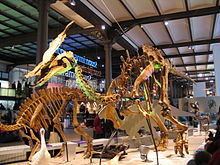| Olorotitan Temporal range: Late Cretaceous,
| |
|---|---|

| |
| Mounted skeleton, Royal Belgian Institute of Natural Sciences | |
| Scientific classification | |
| Domain: | Eukaryota |
| Kingdom: | Animalia |
| Phylum: | Chordata |
| Clade: | Dinosauria |
| Clade: | †Ornithischia |
| Clade: | †Neornithischia |
| Clade: | †Ornithopoda |
| Family: | †Hadrosauridae |
| Subfamily: | †Lambeosaurinae |
| Tribe: | †Lambeosaurini |
| Genus: | †Olorotitan Godefroit et al., 2003 |
| Type species | |
| †Olorotitan arharensis Godefroit et al., 2003
| |
Olorotitan was a monotypic genus of lambeosaurine duck-billed dinosaur, containing a single species, Olorotitan arharensis. It was among the last surviving non-avian dinosaurs to go extinct during the Cretaceous–Paleogene extinction event, having lived from the middle to late Maastrichtian-age of the Late Cretaceous era. The remains were found in the Udurchukan Formation beds of Kundur, Arkharinsky District, Amur Oblast, Eastern Russia, in the vicinity of the Amur River.